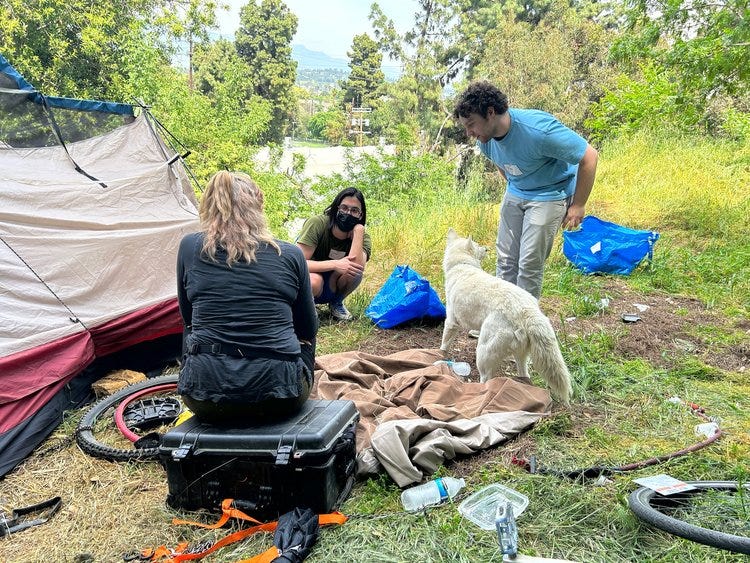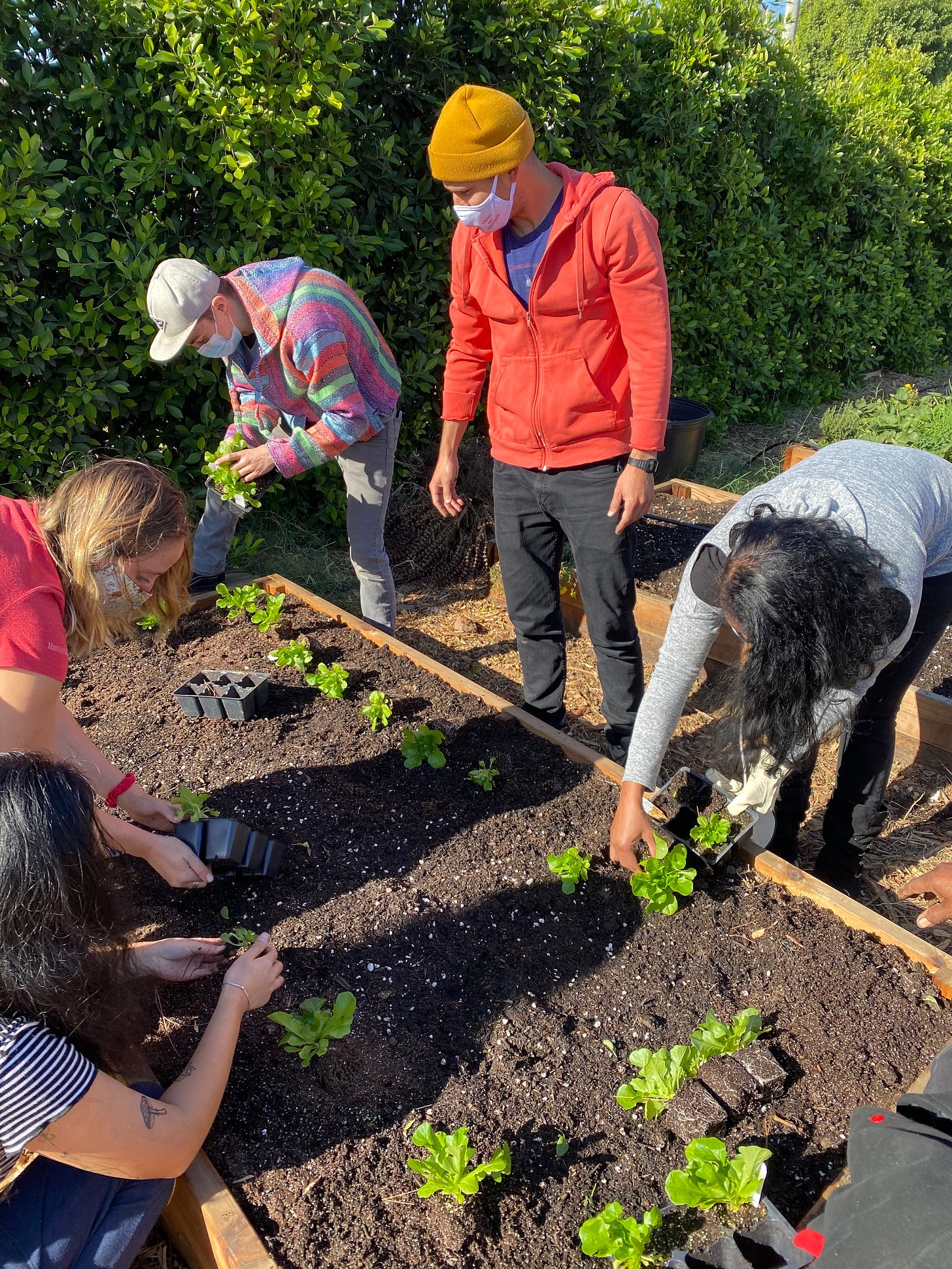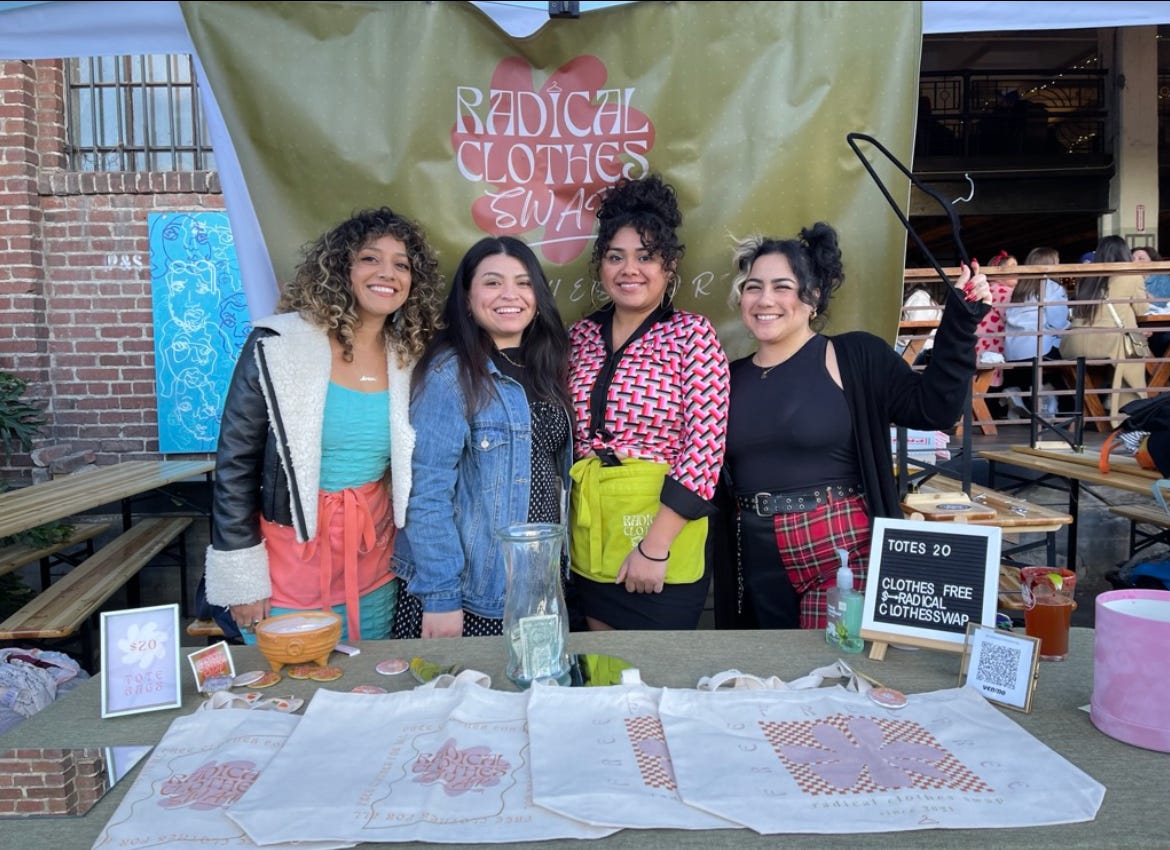Collectives Over Capitalism: The Impact of LA's Mutual Aid
Originally published in Daily Bruin's PRIME Magazine on June 02, 2025
The Los Angeles County fires left many residents with nothing but each other. Fortunately, people power is a force to be reckoned with.
When government initiatives were unequipped to contain the fires raging across the county in January, community mutual aid became the people’s champion. Groups such as Westwood Mutual Aid and SELAH Neighborhood Homeless Coalition rallied to supply affected community members with provisions to carry on – not just food and clothing but spaces to rest, mourn and combat the alienation together.
"We had so many people who reached out because they wanted to immediately help," said Maebe Pudlo, the operations manager for SELAH. "The silver lining of a tragedy is people want to come together and help."
Organizations like these, started by and for community members, have sustained LA neighborhoods for decades – working year-round to help those in need when the administration falls short.
(Photo Courtesy of SELAH Neighborhood Homeless Coalition)
As LA holds the largest unsheltered population of any city in the United States, residents have developed a robust mutual aid network to support often-overlooked communities. Founded in response to larger community crises and discriminatory government practices, these groups inform their actions with firsthand experience, tailoring resources to locals’ immediate needs. By offering free critical services to community members – unhoused or otherwise – they combat LA’s high living costs and insufficient government resources.
The Mutual Aid LA Network is made up of over 100 grassroots organizations across Southern California, addressing community needs such as food, clothing and political advocacy. They are typically independently funded, not for profit and operate primarily on a volunteer basis.
Many of these mutual aid services go beyond material supplies. Concerned for homeless populations in and around Silver Lake, a neighborhood in LA, SELAH grew from a small band of neighbors in 2017 to an organization of over 600 volunteers today, Pudlo said. In addition to distributing food and hygiene products, it advocates for fair housing laws and holds educational workshops to teach volunteers how to best support their unhoused neighbors.
Pudlo said SELAH serves as an educational tool for the community, empowering its members to apply their work to their everyday lives and their own neighborhoods.
"People have become so desensitized to seeing abject poverty on our streets that it’s easy to forget that that’s a human being," Pudlo said. "You should be offended at the circumstances in our society that allow that to happen."
While SELAH assists those who are housing insecure, its mission is to change the discriminatory narrative around people experiencing homelessness – making its work resonate with all members of the community.
(Photo courtesy of SELAH Neighborhood Homeless Coalition)
These inclusive efforts are a trademark of mutual aid groups. While they are often made synonymous with charity organizations, mutual aid is more accurately a practice of reciprocity, said UCLA doctoral student in sociology Sam Lutzker. It disrupts the unilateral movement of charity that goes from higher-income to lower-income individuals, instead emphasizing the importance of sharing resources between all people.
"Mutual aid is survival for poor populations, especially, but also for middle class folks," Lutzker said. "The classic example of going to borrow flour or sugar from your neighbor."
With this understanding, the practice of mutual aid can be traced throughout the history of communal living. It represents a legitimate, alternative approach to modern capitalism, predating the genesis of LA’s high rent costs and No. 1 cause of homelessness in the city, said Theo Henderson, the host of iHeartRadio's "We the Unhoused" podcast. For more than 70,000 people in LA County who can’t make ends meet, mutual aid has become critical for survival.
Henderson learned the importance of community-based assistance firsthand after eight years of living in various degrees of houselessness. Unable to continue work as a teacher because of a medical emergency, Henderson couch surfed, stayed in shelters and slept on neighborhood streets – all while pursuing unsustainable government aid such as Section 8 housing, which places applicants on a sometimes 10-year-long waiting list for rent assistance.
"It’s a very difficult thing when people say there are services out there," Henderson said. "Yes, there are, but you have to understand houselessness is not one person where you can go and get these services, and magically, things are going to be fixed."
Misinterpreting government aid as easily obtainable to those without shelter, many homeowners become desensitized to the inequity that comes with living on the streets, Lutzker said. Henderson added that the Supreme Court's ruling in City of Grants Pass, Oregon v. Johnson – which allowed cities to prohibit public camping – and local laws across Southern California criminalize the existence of people experiencing homelessness and reinforce the apathy that permeates society’s view of them.
"If you can dehumanize an individual, you can then criminalize them," Henderson said.
Indifference toward people experiencing homelessness – or any marginalized group – by the larger population allows the government to impose harmful practices on said groups. This is evident in what Lutzker refers to as the government’s "sweep" approach to homelessness. These large-scale evictions of homeless camps act as an aesthetic Band-Aid, Lutzker said, removing unhoused communities from view under the guise of dismantling the systemic barriers that prevent them from accessing long-term assistance.
Lutzker added that within the current capitalist framework, equitable and humanitarian solutions by mutual aid groups are often dismissed by the government, whose work is more influenced by voters in higher tax brackets.
"It can be adversarial to what the state does, because the state is – yes, sometimes concerned with care – but also concerned with all these other things, including displacing and dispossessing poor unhoused people, because it becomes a problem for them, for their favorite constituents," Lutzker said.
While government agencies provide some tangible needs to their communities, such as temporary shelters and food stamps, mutual aids such as SELAH believe that building strong community bonds is just as important. It is in this way that these groups facilitate holistic support for their communities and support their mental and emotional well-being, Pudlo said.
Shift Our Ways Collective follows this model of service in addressing the nutritional needs of LA County residents. The Arleta, California-based mutual aid prides itself on "eco hubs," where local families can harvest two pounds of free produce per week directly from stem and soil. Madison Jaschke, co-founder and executive director of SOW, said that in an urban food desert where high-quality meals are largely unaffordable, the mutual aid gives its community greater access to green space and fresh foods, as well as empowering them to pursue sustainability in other aspects of their lives.
"It’s a place to enrich and fulfill your values and your needs socially as well – not just your basic needs," Jaschke said.
(Photo courtesy of Shift Our Ways Collective)
Through SOW’s Youth & Community Harvest Internship, teens and young adults are encouraged to apply their career skills to sustainability projects that foster the collective’s growth. Jaschke shared that these projects take endless forms – from making solar-powered produce refrigerators to programming educational events for urban planners – and their creators exercise their own innovation for positive community change.
Lutzker said it is this type of creative problem solving that characterizes the work of mutual aid groups and should garner interest by government bodies. These ideas are motivated by a desire for comprehensive social betterment rather than the desires of specific interest groups.
"They have some of those really radical anarcho-socialist ideas – not just big-state socialism but also other ideas of care that I think are intriguing, worth discussing, worth also bringing into the halls of power," Lutzker said.
Nicole Macias and Enriquetta Navarro, the respective co-founder and co-director of Radical Clothes Swap, said they believe mutual aids are necessary for diluting capitalism’s potent control of people’s livelihoods. By holding free clothing swap meets across LA, Radical Clothes Swap helps offset levels of material overproduction by large fashion manufacturers – in turn supporting a circular economy that is environmentally sustainable.
(Photo courtesy of Radical Clothes Swap)
With the rate of global material production tripling over the last 50 years, according to the United Nations Environment Programme, Macias said it’s not only unnecessary for manufacturers to continue making and selling clothes but detrimental to the health of our natural world.
"We’re literally killing the planet with all of these things that we’re consuming on the daily," Macias said.
Navarro said Radical Clothes Swap decentralizes modern consumer culture and educates people about the ways in which overconsumption causes harm to the environment and each other. Lutzker said the coexistence of overproduction and poverty is a direct outcome of a capitalist society; the hazardous abundance produced is only accessible to those able to pay the highest price.
Though industries and elected officials hold the whips that spur overproduction into rampancy, Navarro said that in order for the work of Radical Clothes Swap to be commonplace, mutual aids must be backed by government policy.
"It cannot just be our responsibility to combat this," Navarro said. "There has to be something bigger that’s happening."
(Photo courtesy of Radical Clothes Swap)
The issue isn’t a lack of government programs. The 1980 Superfund Act was an attempt to clean up toxic waste sites across the country, and LA Mayor Karen Bass’ Inside Safe program was designed to provide people experiencing homelessness with indoor living facilities. The problem is that programs like these fail to provide sustainable solutions for impacted groups and often cite budget deficits as a considerable reason for this.
However, whether or not the relevant government departments are in need of cost-cutting measures is up for debate. Westwood Neighborhood Council President Lisa Chapman said LA County has billions of budget dollars that, rather than being put toward productive welfare initiatives, are primarily used to cushion the salaries of those involved with the current ineffectual programs.
"All of those entities, they are so bureaucratic in themselves that when you take an astounding problem like this, they don’t deal with it well," Chapman said.
She added that lawmakers must push for legislation that holds the current bureaucracy accountable for how it spends its budgets. Though its influences on capitalism are severe, Lutzker recognized that a complete overhaul of government operations isn’t necessary to meet people’s needs. Rather, he advocated for greater government regulations and an increase in welfare assistance.
"Capitalism also doesn’t have to look this bad," Lutzker said. "There are different ways to rein in some of the worst products of that system. The U.S. is just not doing it."
While the efforts of mutual aids and the government can appear adversarial, there is wide acknowledgement that they must all work together to correct the missteps taken toward marginalized communities. Lutzker and Chapman argue that, in proper cooperation, it is the responsibility of mutual aids to challenge government practices and for the government to inform its legislation with community perspectives in mind.
Chapman said comprehensive services – not piecemeal fixes for individual issues – would better the chance of providing people with sustainable care, rather than temporary fixes that ultimately leave their situations unchanged.
"It seems like this vicious cycle that we just can’t get out of, and it’s because we don’t have the resources set up so that we can succeed," she said.
As the federal administration continues along a divisive course – with limited progress on these issues at the local level and looming threats against marginalized communities and the environment at the national level – mutual aids such as SOW and Radical Clothes Swap believe their work is more important than ever. Their work goes beyond meeting the needs of their neighbors, stretching to unite communities in demanding more collaboration between them and the government.
By weaving mutual aid practices into everyday life, a new cycle can replace that which is outdated and commonplace – one where capitalistic pursuits are made secondary to community knowledge and reciprocity.
"Doing something good for the community, showing up and then inspiring others to also do that," Jaschke said. "Because who’s going to do the work if it’s not us?"
(Photo courtesy of Shift Our Ways Collective)









